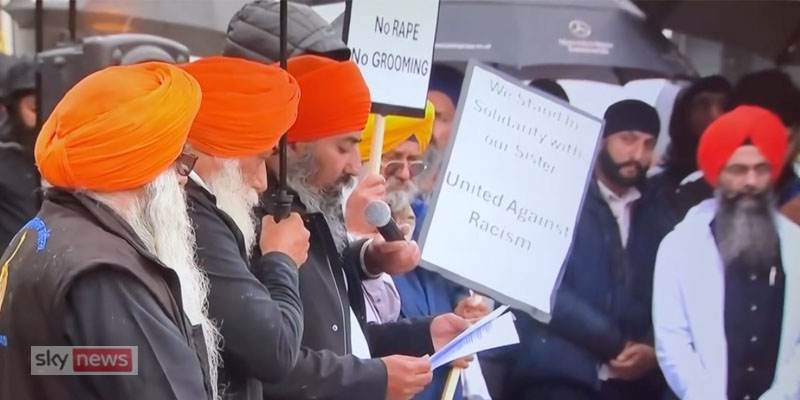By Asia Samachar,Gurnam Singh
Copyright asiasamachar

By Gurnam Singh | Opinion |
On Tuesday, 11th September 2025, a horrific attack on a British-born Sikh woman in her twenties sent shockwaves through the community. What makes it even more worrying is that this attack took place within touching distance of eight gurdwaras in the small town of Oldbury. Part of the Borough of Sandwell in the UK Midlands, this is one of the most ethnically diverse parts of the UK and home to a large Sikh community.
The assault was not merely an attack on an individual; it was an assault on the dignity, humanity, and the shared values that bind us all. In this regard, it must be seen as wake-up call for those who may have felt that the kinds of racial hatred that the first generation of migrants had to endure in the 1960’s and 70’s was part of history. On a positive note, the response from all sections of the community has also demonstrated extraordinary resilience: a community united in protest, MPs demanding justice, and a faith that calls for the welfare of all.
The Sandwell Attack
Police are treating the crime as racially aggravated, after the perpetrators reportedly told the victim during the assault: “You don’t belong in this country, get out.”
The victim was on her way to work near Tame Road in Oldbury when she was attacked by two men. In a courageous public statement, she expressed both the trauma she endured and the gratitude she feels for the support she has received: “I would never wish this on anyone. All I was doing was going about my day on my way to work, and what has happened has deeply affected us. Through it all, my family has been my rock, and my community has stood strong beside me… We are going through a lot, but the strength and kindness shown by the right people in the community has been incredible, and I can’t thank them enough for being my voice.”
Her words reveal the devastating impact of the crime, but also the resilience and strength that emerge from communal solidarity.
Protest and Political Response
On the Sunday 14 September, hundreds of members of the Sikh community took part in a peaceful demonstration, beginning at the Guru Nanak Gurdwara in Smethwick and moving toward the scene of the attack. The march was both an act of solidarity with the victim and a collective demand for justice and safety. As Kuldeep Singh Deol, former president of the Guru Nanak Gurdwara, said:“This attack on our sister is shameful. Our daughters, sisters, and mothers deserve to be safe, regardless of colour or which faith they belong to.”
Local MP Gurinder Singh Josan has actively pursued justice at the highest levels of government, confirming that he had raised the case with ministers in the Equalities Office and with the Home Secretary, Rt Hon Shabana Mahmood MP, including asking a direct question in the House of Commons on 16th September. The Home Secretary condemned the racially motivated attack and reaffirmed the government’s commitment to ensuring justice is delivered.
Other community voices were equally resolute. Sangat Singh reminded the nation of the Sikh community’s longstanding contribution to Britain: “This was a vile act of racial hatred and sexual violence. Sikhs have stood for this nation, from Saragarhi to the world wars, earning Victoria Crosses for bravery. We are proud citizens, contributing through the NHS, in business, and across British society. This was not only an attack on our community, but a violation of a woman’s dignity; it must be met with justice. We have as much right to this country, and its symbols, as anyone else. We will not tolerate extremism in its name.”
On 16th Sept ordinary people and activists from across communities gathered at a vigil in Oldbury to show their support for the woman and discuss violence against women. Calls by attendees were made to raise awareness of misogynism and abuse against women and the need for the community from all backgrounds to “stand together united”.
Sikh Teachings and the Politics of Division
From a Sikh perspective, this attack is far from an isolated incident. It occurs within a broader climate of hostility, racism, and far-right extremism in the UK. Figures such as Tommy Robinson have built movements on a strategy of divide and rule, exploiting societal tensions to foster hatred between minority communities.
Regrettably, and somewhat bizarrely given that the case in question is clearly a race-hate crime, a small but vocal number of misguided Sikhs, almost entirely men, have been drawn, mostly via social media, into anti-Muslim and anti-immigrant rhetoric, expressing solidarity with the Far-Right. To the credit of the broader Sikh community, these individuals have been widely condemned.
One of the core Sikh teachings is to reject ideas and individuals who sow divisions amongst people. Guru Nanak’s vision of the oneness of humanity (Ik Onkar) and Guru Gobind Singh’s proclamation to ‘recognise the human race as one’, calls on us to see beyond artificial divisions of race, religion, caste, class, gender and sexuality. Guru Tegh Bahadur, whose 350th martyrdom anniversary is being commemorated this year, sacrificed his life to defend the religious freedom of all, not just Sikhs. Guru Gobind Singh insisted that tyranny must be resisted, but never at the expense of truth or justice. The Gurus understood that oppression thrives when communities are turned against one another, and they rejected such politics in favour of solidarity with the downtrodden.
It is therefore deeply concerning that even a small number of Sikhs, particularly on social media, appear to align with far-right propaganda, spreading Islamophobia and xenophobia. In doing so, they betray Sikh principles and play directly into strategies that weaken all communities. True Sikh activism must never build walls between communities; it must build bridges. It must always reflect sarbat da bhala, the welfare of all, which all Sikhs attest to twice per day during their morning and evening prayers. Our strength has always come from standing together, aligning with the truth and not from false alliances rooted in hatred.
Lessons from Britain’s Anti-Racist Struggles
The Sandwell race hate rape case compels reflection on Britain’s history of anti-racist struggle. In the 1970s and 80s, minority communities organised powerful movements to resist discrimination and far-right violence. Asian Youth Movements, the British Black Panther Movement, the Black Unity and Freedom Party, and various trade unions and workers’ associations played pivotal roles in grassroots resistance.
These movements were non-sectarian and secular, recognising that unity across communities was essential to winning civil rights. Sikhs, Muslims, Hindus, and Afro-Caribbean communities often stood shoulder to shoulder against the National Front and other racist organisations. Their strength came from solidarity, from refusing to be divided, and from recognising that an attack on one community was an attack on all.
Though from different parts of the world and a variety of linguistic and faith traditions, what bound them in solidarity was a universal and shared sense of justice and human dignity and rights that had been fostered during anti-colonial struggles in the post War period from the 1940’s. Indeed, the unity was so powerful that most non white minority groups chose to privilege their collective identity of Black’ rather than emphasising the ethnicity and religious, which is the case today. This legacy of anti-imperial and anti-racist collectivist politics must inspire us today. Just as the youth and workers of that generation refused to bow to racism, we too must resist the Far-Right’s attempts to pit communities against one another.
A Wider National Picture
The Sandwell case is not an isolated incident but part of a disturbing national trend over the past decade or so. Since the Brexit referendum, the rise in hate crimes, normalisation of racist rhetoric, especially in relation to migrants and asylum seekers, and emboldening of far-right figures have created a climate in which minorities feel less safe. From attacks on Muslims to racist abuse against Black Britons, violent protests outside asylum hotels, and upsurge of race hate crimes against Sikhs and Hindus, the pattern is clear: Far-Right extremism threatens the safety and dignity of all.
We must resist the temptation to view these attacks narrowly as communal issues. They are attacks on justice, equality, and humanity itself. If we allow extremists to divide us, we all lose. If we stand together, we gain the strength to resist.
Remembering Who We Are
As we reflect on the horrific attack in Sandwell, we must remember the values we uphold. Sikh teachings leave no room for sectarianism or alliances with those who trade in hate. Our Gurus taught that humanity is one, dignity belongs to all, and oppression must be resisted wherever it appears. Standing with those who seek to divide communities betrays these principles.
The example of Britain’s anti-racist struggles of the 1970s and 80s remains instructive. Asian Youth Movements, Black Panther organisations, and trade unions demonstrated that minority communities, united across faith and culture, could challenge the Far-Right and achieve meaningful change. Their strength came from solidarity, from refusing to be divided, and from recognising that an attack on one was an attack on all.
To those few misguided individuals in our community who might be drawn to far-right rhetoric, I say, reflect carefully. The Far-Right neither defends Sikh dignity nor safeguards equality. Its goal is division, weakening all of us. Sikhism and our shared history in Britain show a different path; one of unity, resistance, justice and love, not hate!
The Sandwell case should strengthen, not weaken, our resolve. Let it remind us that our is not one of division but solidarity with all who face racism and violence. Only by upholding these traditions can we honour both the sacrifices of our Gurus and the struggles against racism and oppression of those who came before us on these very streets of Britain.
Gurnam Singh is an academic activist dedicated to human rights, liberty, equality, social and environmental justice. He is an Associate Professor of Sociology at University of Warwick, UK. He can be contacted at Gurnam.singh.1@warwick.ac.uk
* This is the opinion of the writer and does not necessarily represent the views of Asia Samachar.
RELATED STORY:
Man arrested over ‘racially motivated’ rape of Sikh woman in Britain (Asia Samachar, 15 Sept 2025)
ASIA SAMACHAR is an online newspaper for Sikhs / Punjabis in Southeast Asia and beyond. You can leave your comments at our website, Facebook, Twitter, and Instagram. We will delete comments we deem offensive or potentially libelous. You can reach us via WhatsApp +6017-335-1399 or email: asia.samachar@gmail.com. For obituary announcements, click here



